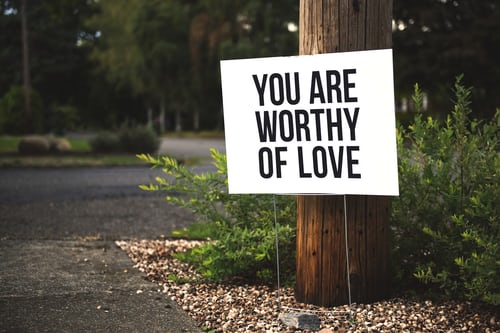As I sit here in my gorgeous little office reflecting on the life, I lived with anorexia nervosa it seems absolutely absurd that I could ever have doubted if recovery was 1. possible and 2. worth it.
Knowing what I know now, living how I live now, feeling how I feel now, being who I am now I wouldn’t trade this for the world.
However, I certainly do know that there was a time when I felt differently, a time when I did doubt both that recovered was something I could ever experience (other people yes, but not me) and most of all that any recovered life could be worth the pain of going against what my body was telling me to do (aka exactly what you must do in order to recover).
There are many reasons why the process of recovery is so hard and while some of them will be entirely exclusive to your circumstances and situation there are themes. Which is why in this blog I’ve decided to include just three of the many and these three are overarching reasons why recovery is so hard. Which means they apply to everyone, whether you are contemplating or in recovery.
So, if that’s you please take a read and as you do I hope you being to understand that no matter how hard it is right now, no matter what you think or believe right now, no matter your doubts or limitations you don’t know what’s possible.
You simply don’t know what’s possible, what you’ll be capable of tomorrow, next week, next year, in 10 or 20 years…
The best day of your life may still be to come.
3 reasons recovery from an eating disorder is so hard and how to use this knowledge as power…
- Recovery is Choosing Chaos

Choosing recovery, as strong as the hope and excitement you sometimes feel about the prospect of being free, at the end of the day means choosing chaos.
In recovery there are no guarantees.
Maybe you do all this work, experience all this pain only to remain sick and stuck for the rest of your life. Who knows? You certainly don’t know that anything is going to turn out better when you decide to take the leap.
It doesn’t feel like choosing recovery is choosing the good thing because recovery itself sucks (to put it mildly). If it didn’t, if there were guarantees to do this or that and all would be well at the end everyone would choose it and fly through it.
2. The Gains are Majorly Delayed

As much as recovery sucks there is one reason people decide to do it and it is hope.
It is hope, however minute, shaky and fleeting, that a different way of living just may be possible.
Often, we choose recovery not because we believe yet that a better future is possible but because the pain of staying the same (or dying) is worse than the unknowns of recovered. Often, we’re not yet motivated by a better future but just a chance at a different one.
It is the goal on the other side recovered which is the reward, not the recovery itself and that reward is majorly delayed. Which means you must go against the messages every fibre of your being is sending you now for a chance at a better life sometime in the distant future and which you don’t even fully believe in.
It’s like someone saying to you “here, invest all your time, energy, money, heartache, pain, turmoil, exhaustion into this and then mmmmm perhaps it will lead to a better future, oh but perhaps it won’t but just give it everything you have until you have nothing left and we’ll see shall we?”.
Wow. If that’s not a big ask I don’t know what is.
That’s rough.
3. The “What” and “How” Are Unclear

When you have an infection or a broken arm it’s usually quite straightforward and clear what you have to do for treatment.
You take antibiotics or you have a cast put on your arm and you then don’t move it for a few weeks. If you follow your doctor’s instructions your healing is pretty well guaranteed.
When it comes to mental health the “what” to do is far less clear. The “how” to do it even more murky, confusing (because everyone has an opinion) and most of the time utterly elusive.
We don’t have any guidelines that say do “this” and you will recover from an eating disorder in 4-6 weeks.
When it comes to recovering from mental health issues there are some broad overarching areas of your life you will need to address if you want to step into being different and the chance at a new future. A great many health professionals will not help you to understand or address these overarching areas because they’re simply not trained in this and therefore not able to give you this information. Furthermore, even if they are and do give you the information the specifics of what you need to do are entirely unique to you.
It is unclear, until it is clear.
Take Home Message

The main things I want you to take away after having read this are that recovery is hard, let’s not waste time pretending otherwise.
Recovery is hard because it is choosing complete, all-encompassing chaos.
Recovery is hard because it is choosing pain. A type of pain I’ve not known since and which cannot be captured in words, an explanation of brain chemicals or genes. A pain that cuts you to the core of your being and soul (even if you don’t believe in souls).
Of course, in hindsight it is a trade-off between short term pain for long term gain, but you don’t know that when you’re in the midst of it, you don’t know that when you’re making the day-to-day micro decisions that make up recovery.
Recovery is hard because there are no guarantees that what you do will get you to recovered.
Recovery is hard because you don’t know what will and won’t “work”. Which means you have to risk tyring things before you know if they will help, hurt or do nothing.
Recovery is hard because the “what to do and the how to do it” are not clear or straightforward.
Recovery is hard.
Living with an eating disorder is hard.
Never knowing what your life could have been is hard.
Never knowing who you could have been is hard.
Choose your hard.
With my whole heart I hope you found this information useful and inspiring.

Become Great. Live Great.
Bonnie.




2 thoughts on “Why Is Recovery So Hard? Making the Decision With Your Eyes Open”
Insightful post! Xxoo
Thank you Lulu <3 😀